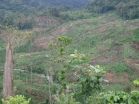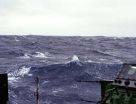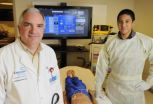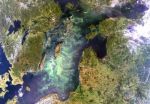Low-dose aspirin reduces death rates from range of cancers by between 20 and 30 percent
Benefit unrelated to dose, gender or smoking -- but increases with age
2010-12-07
(Press-News.org) The London School of Hygiene & Tropical Medicine (LSHTM) has contributed to a study showing that a low dose of aspirin reduces the occurrence of several common cancers. The study is published in today's Lancet.
The work was started and carried out by Professor Peter Rothwell in Oxford, and is based on an overview of several randomised trials of aspirin. These have been primarily concerned with reducing heart attacks, but have also gathered information on deaths from cancer.
The trial contributing most information to the overview has been the Thrombosis Prevention Trial (funded jointly by the Medical Research Council and the British Heart Foundation) which was carried out by Tom Meade when he was with the Medical Research Council. Professor Meade is now Emeritus Professor of Epidemiology in LSHTM's Department of Non-Communicable Disease Epidemiology.
As well as confirming that low dose aspirin reduces large bowel cancer cases reported in another recent study also led by Professor Rothwell and to which Professor Meade contributed, it also reduces total deaths due to cancer because it affects several common individual cancers, such as those of the oesophagus (gullet), lung, stomach, pancreas and possibly the brain. Reductions in deaths are around 20-30%.
Benefit is unrelated to aspirin dose from 75mg upwards, gender or smoking habit but increases with age. Aspirin may need to be taken for at least five years before it confers benefit, probably longer for some cancers, but benefit is generally greater the longer aspirin has been taken.
Hitherto, advice about aspirin has been mainly concerned with reducing heart attacks and strokes in those who have already had them. Caution should be exercised by those who are so far free of these conditions because, unless a person's risk of them is very high, the benefit may be outweighed by the risk of serious bleeding.
Professor Meade says: 'These are very exciting and potentially important findings. They are likely to alter clinical and public health advice about low dose aspirin because the balance between benefit and bleeding has probably been altered towards using it', although Professor Meade adds that this does not mean everyone should automatically take aspirin. Health professionals and others will now have to consider the practical implications.
INFORMATION:
To interview Professor Meade, please contact Lindsay Wright in the London School of Hygiene & Tropical Medicine Press Office on +44 (0) 207 927 2073 or email lindsay.wright@lshtm.ac.uk
END
ELSE PRESS RELEASES FROM THIS DATE:
2010-12-07
Scientists have created the highest resolution map of the Sumatran tiger distribution ever produced, revealing that the island now hosts the second largest tiger population on earth. The research, carried out with the Wildlife Conservation Society's Indonesia Program and Forum HarimauKita, will be published in a special issue of Integrative Zoology, on tiger conservation and research methodologies.
Hariyo T. Wibisono and Wulan Pusparini conducted a questionnaire-based survey across the island to identify the status of Sumatran tiger distribution. They found that tigers ...
2010-12-07
The risk of having a heart attack is 60 per cent higher just a year after a patient has been diagnosed with rheumatoid arthritis, according to research published in the December issue of the Journal of Internal Medicine.
Swedish researchers followed 7,469 patients diagnosed with rheumatoid arthritis (RA) between 1995 and 2006, together with 37,024 matched controls without RA to determine the risk of ischaemic heart disease, with particular reference to myocardial infarction (heart attack). The maximum follow-up was 12 years and the median was just over four years.
"Our ...
2010-12-07
Tapping into young people's use of online social networks presents health agencies with a powerful opportunity to help control the rise in HIV and other sexually transmitted infections in homeless youth in Los Angeles. According to new research1 by Sean Young from UCLA and Eric Rice from USC in the US, online social networking - and the topics discussed on these networks - have the potential to affect sexual risk behaviors. Targeting homeless youths with sexual health messages, by exploiting their use of these networks, is likely to be an effective way to reach and influence ...
2010-12-07
A brand-new bacterial species has been found aboard the RMS Titanic, which is contributing to its deterioration. The discovery reveals a potential new microbial threat to the exterior of ships and underwater metal structures such as oil rigs.
The researchers, who report their findings in the latest issue of the International Journal of Systematic and Evolutionary Microbiology published on 8 December, isolated the micro-organisms from a 'rusticle', collected from the RMS Titanic, 3.8 km below the ocean surface.
The novel bacterium has been named Halomonas titanicae by ...
2010-12-07
Researchers in South America have studied the viability of using earthworms to process hazardous material containing high concentrations of heavy metal for the bioremediation of old industrial sites, landfill and other potentially hazardous areas. They provide details of a possible approach in the International Journal of Global Environmental Issues this month.
After pollinating insects, worms are probably the gardener's best friend and they have been encouraged to process garden waste and soil for generations. The common earthworm, Eisenia fetida, could also become a ...
2010-12-07
A team led by scientists at the United Kingdom's National Oceanography Centre have measured the air-sea exchange of carbon dioxide in the open ocean at higher wind speed then anyone else has ever managed. Their findings are important for understanding how interactions between the oceans and the atmosphere influence climate.
"Evaluating the factors influencing the transfer of gases such as carbon dioxide between the atmosphere and the ocean is needed for a full understanding of Earth's climate system," explained researcher John Prytherch of the National Oceanography Centre.
The ...
2010-12-07
A well-known paper-based medical chart used by pediatric emergency personnel across America is undergoing a 21st century boost in an collaborative effort between Virginia Tech's College of Engineering, Roanoke-based Carilion Clinic Children's Hospital, and the physician who created the original method some 25 years ago.
The Broselow Pediatric Emergency Tape – otherwise known as the Broselow Tape -- has been a staple of ERs and child trauma units for nearly three decades. Created by Hickory, N.C.-based physician James Broselow, the Broselow Tape is a long, durable tape ...
2010-12-07
Tel Aviv ― Naukrtis, a Greek trade emporium on Egyptian soil, has long captured the imagination of archaeologists and historians. Not only is the presence of a Greek trading settlement in Egypt during the 7th and 6th century B.C.E. surprising, but the Greeks that lived there in harmony hailed from several Greek states which traditionally warred amongst themselves.
Dr. Alexander Fantalkin of Tel Aviv University's Department of Archaeology is delving deeper into this unique piece of ancient history to come up with a new explanation for how Naukrtis developed, and ...
2010-12-07
Continued eutrophication of the Baltic Sea, combined with an ever thinner ozone layer, is favouring the toxic cyanobacterium Nodularia spumigena, reveals research from the University of Gothenburg, Sweden.
"There are several species of cyanobacteria, or blue-green algae, that can form surface blooms in the Baltic Sea," explains Malin Mohlin from the University of Gothenburg's Department of Marine Ecology. "Which species ends up dominating a bloom depends partly on how they deal with an increased amount of UV light and a shortage of nutrients. Nodularia spumigena is most ...
2010-12-07
Pregnant mums who regularly use mobile phones may be more likely to have kids with behavioural problems, particularly if those children start using mobile phones early themselves, suggests research published online in the Journal of Epidemiology and Community Health.
The researchers base their findings on more than 28,000 seven year olds and their mothers who were part of the Danish National Birth Cohort (DNBC) study.
This study enrolled nearly 100,000 pregnant women between 1996 and 2002, with the intention of tracking their kids' long term health.
The mums supplied ...
LAST 30 PRESS RELEASES:
[Press-News.org] Low-dose aspirin reduces death rates from range of cancers by between 20 and 30 percent
Benefit unrelated to dose, gender or smoking -- but increases with age




